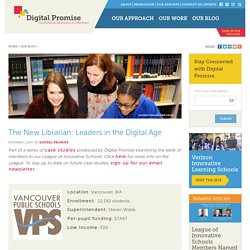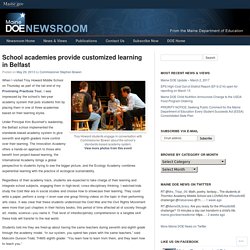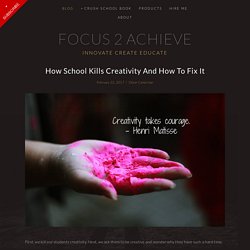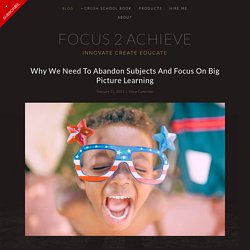

The Future of Learning: Trung Le at TEDxNYED. The Third Teacher - case study. Finland Will Become the First Country in the World to Get Rid of All School Subjects. The New Librarian: Leaders in the Digital Age - Digital Promise. | by Digital Promise Part of a series of case studies produced by Digital Promise examining the work of members in our League of Innovative Schools.

Click here for more info on the League. To stay up to date on future case studies, sign up for our email newsletter. Location: Vancouver, WA Enrollment: 22,192 students Superintendent: Steven Webb Per-pupil funding: $7,447 Low Income: 53% As school districts confront budget constraints and cuts, one of the first places administrators often look for savings is the school library. These cuts can impact both students and teachers. For these reasons, Vancouver Public Schools in Vancouver, Washington, is investing in its librarians while others are cutting back. A cohort of 33 teacher-librarians is viewed as indispensable to the district’s vision of a technology-infused path to improved outcomes for students. Teacher-librarians at VPS play a crucial role in this digital transformation and other strategic initiatives.
Reasserting Relevance. Research. School academies provide customized learning in Belfast. When I visited Troy Howard Middle School on Thursday as part of the tail end of my Promising Practices Tour, I was impressed by the school’s two-year academy system that puts students first by placing them in one of three academies based on their learning styles.

Under Principal Kim Buckheit’s leadership, the Belfast school implemented the standards-based academy system to give seventh and eighth graders more control over their learning. The Innovation Academy offers a hands-on approach to those who benefit from project-based learning, the International Academy brings a global perspective to students trying to see the bigger picture, and the Ecology Academy combines experiential learning with the practice of ecological sustainability.
Regardless of their academy track, students are expected to take charge of their learning and integrate school subjects, engaging them in high-level, cross-disciplinary thinking. Resources View photos from this event Like this: Like Loading... Focus 2 Achieve - How School Kills Creativity And How To Fix It. First, we kill our students creativity.

Next, we ask them to be creative and wonder why they have such a hard time. We always aspire for our students to move away from fact regurgitation and move toward higher level thinking and deeper understanding. When we ask students to brainstorm and generate ideas, provide solutions to problems, or to think and reason critically, we are really asking them to be creative. The sad truth is that by standardizing education we often kill creativity.
The hope lies in the fact that creativity is an acquired skill that can be improved. The human brain is composed of gray matter and white matter. The mechanism of becoming more creative is simple: Create many connections in the brain by learning new and diverse things and using them in projects we are passionate about. When we take on creative tasks, we increase the amount of white matter, the number of neural connections in the brain, and as a result we become more creative. This one is huge. I know. Focus 2 Achieve - Why We Need To Abandon Subjects And Focus On Big Picture Learning. I think we got it all wrong in education.

Consider this. We always talk about connecting the classroom (the instruction, the subject area, the concepts etc.) to the real world. But, doesn't it make more sense to take what's happening in the real world and just teach that? The whole idea of having to connect school to the real world came from the fact that most subjects are taught in isolation from it. Why can't we change that? Take Dakota Access Pipeline (DAPL). Chemistry: What exactly is oil? Physics: What are the physics of transporting it from ND to IL? Geography: What landforms etc. does it have to go through? Biology/Geology/Environmental Science: What sediment does the pipeline go through? Engineering: How is the oil extracted from the ground? Humanities/Psychology/Culture/Law/Social Studies: How does it affect the local population? Arts: Research the music, pottery, and other art produced by the native population. English/Speech: Read, write, discuss, and speak on the issues.